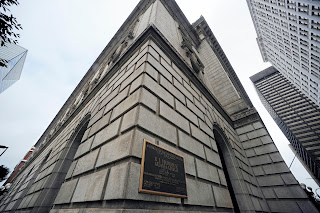A Florida church known for its use of ayahuasca tea in religious retreat ceremonies wants an appeal court to revive its challenge to a DEA decision prohibiting its use of the hallucinogenic drink.
Courthouse news service
KAYLA GOGGIN / January 25, 2023
KAYLA GOGGIN / January 25, 2023
ATLANTA (CN) — An attorney for an Orlando church asked an 11th Circuit panel on Wednesday to overturn a Florida federal judge’s dismissal of its challenge to a Drug Enforcement Administration decision prohibiting the church from using psychedelic ayahuasca tea in its religious retreats.
Billing itself as a “spiritual learning and healing center,” Soul Quest Church of Mother Earth offers three-day retreats at its facility where participants can imbibe ayahuasca, a tea that contains the hallucinogen dimethyltryptamine, or DMT, in search of a religious awakening. For a $999 donation, Soul Quest Church extends participants the chance to join in on weekend retreat ceremonies to experience the “healing” attributes of the tea.
There’s just one problem: federal drug enforcers say the church is not entitled to a religious-based exemption to the Controlled Substances Act, the federal law designating DMT as a Schedule I substance with no currently accepted medical use.
Regardless of the DEA’s decision and a wrongful death lawsuit arising from one of its retreats, the ceremonies have continued unabated for the last seven years.
An attorney representing Soul Quest Church and its leader, Christopher Young, told a panel of the Atlanta-based appeals court that a Florida federal judge unfairly dismissed his clients’ lawsuit against the DEA last March.
The church sued the agency under the Religious Freedom Restoration Act, claiming in legal filings that its refusal to issue a religious exemption for the sacramental use of ayahuasca violates the First Amendment’s free exercise clause. Soul Quest Church had previously sued to block the DEA from enforcing the Controlled Substances Act against its use of the tea.
U.S. District Judge Wendy Berger ruled that the court did not have jurisdiction over the case and dismissed it.
The plant-based brew made from Amazonian vines and leaves originated with indigenous cultures in Latin America but in recent years has become popular among westerners seeking to treat physical, spiritual and mental ailments, including depression.
According to a 2016 review published in the journal Frontiers in Pharmacology about the therapeutic potentials of ayahuasca, the perception-altering tea often produces visions of beautiful scenery, “power animals, spirit guides, topical motifs, vibrant and varying geometric patterns” and induces self-reflection.
In its decision rejecting the church’s petition for a religious exemption to use the tea, the DEA determined that Soul Quest Church did not show that its use of ayahuasca is “pursuant to a religious exercise and based on a sincerely held religious belief.” The agency determined that the church promotes the use of ayahuasca for self-help and therapeutic reasons, not for religious ritual purposes.
But the church has claimed that the DEA failed to properly conduct an investigation into the sincerity of its religious use of ayahuasca, calling the process “defective in practice” in court filings.
Arguing on behalf of Soul Quest Church, attorney Derek Brett of the Burnside Law Group reiterated that claim on Wednesday.
Asked by U.S. Circuit Judge Britt Grant whether anyone could look at the evidence and question the religious sincerity of the group, Brett said it was not up to the DEA to make that call. Brett told the panel the church was entitled to “the same robust protections” that Congress anticipated under the Religious Freedom Restoration Act.
Justice Department attorney Lowell Sturgill, Jr. asked the panel to uphold the lower court’s decision, arguing that the church has failed to follow the appropriate procedures to appeal the DEA’s decision.
Instead of filing a petition for review within 30 days, the church elected to challenge the denial in federal court by adding it to the initial lawsuit against the agency. This type of legal maneuvering doomed the church’s appeal, DOJ attorneys argued in an appellate brief.
The government has also argued in legal filings that its denial of Soul Quest Church’s exemption request is in the interest of public health and safety. Although the church lists common side effects of drinking ayahuasca tea on its website – including panic, paranoia, vomiting and diarrhea – it claims that the brew “seems to be safe” for healthy individuals.
According to Berger’s ruling, church members are educated and evaluated for suitability before participating in the ceremony. But an investigation by the DEA revealed that the church does not always follow its own policies.
Soul Quest Church was sued in March 2020 for wrongful death after a 22-year-old participant in one of its ceremonies died. According to the lawsuit filed in Orange County Circuit Court, Brandon Begley began behaving “erratically” and making “abnormal bodily movements” after taking part in a Kambo session.
The session involved the administration of poisonous secretions from South American giant monkey frogs through holes burned into Begley’s skin with a heated stick.
The lawsuit filed by Begley’s father alleged that Soul Quest Church's employees waited three hours before calling 911. The action claims that employees failed to properly monitor Begley or prevent him from drinking an unsafe amount of water, leading to his hospitalization for respiratory failure and an anoxic brain injury.
Begley died several days later.
Another lawsuit filed by Kevin Rupchand the following year alleged that he had a seizure and lost consciousness after drinking too much water during a ceremony in which participants consumed a poison from tree bark.
In light of the allegations, the DEA argued in its appellate brief that refusing to grant the church a religious exemption “is the least restrictive means of protecting the public health and safety.”
Grant and fellow Trump appointee U.S. Circuit Judge Kevin Newsom were joined on the panel by U.S. Circuit Judge Jill Pryor, an Obama appointee.
The panel did not indicate when it would reach a decision in the case.


No comments:
Post a Comment